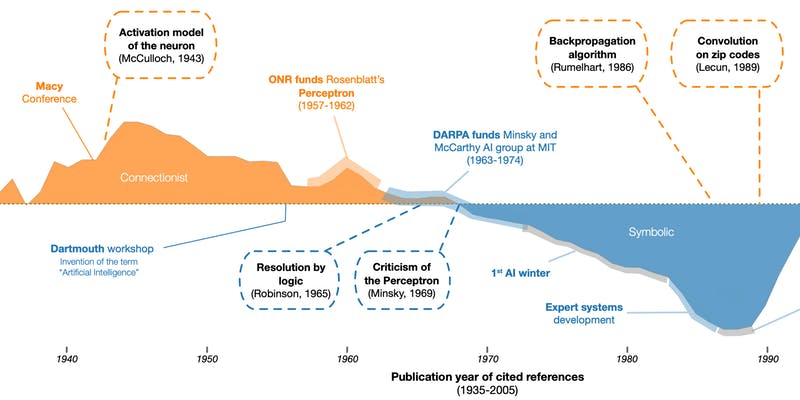[three_fourths]
Where do the predictive techniques of machine learning come from? How do they draw on previous “connectionist” and “symbolic” approaches in the history of artificial intelligence research? Join us for a public talk with Dominique Cardon (Sciences Po Médialab) at the Department of Digital Humanities, King’s College London.
Neurons spike back. The invention of inductive machine and the Artificial intelligence controversy – Dominique Cardon (Sciences Po Médialab)
Since 2010, machine learning based predictive techniques, and more specifically deep learning neural networks, have achieved spectacular performances in the fields of image recognition or automatic translation, under the umbrella term of “Artificial Intelligence”. But their relation to this field of research is not straightforward. In the tumultuous history of AI, learning techniques using so-called “connectionist” neural networks have long been mocked and ostracized by the “symbolic” movement. This talk retraces the history of artificial intelligence through the lens of the tension between symbolic and connectionist approaches. From a social history of science and technology perspective, it seeks to highlight how researchers, relying on the availability of massive data and the multiplication of computing power have undertaken to reformulate the symbolic AI project by reviving the spirit of adaptive and inductive machines dating back from the era of cybernetics.
The hypothesis behind this communication is that the new computational techniques used in machine learning provide a new way of representing society, no longer based on categories but on individual traces of behaviour. The new algorithms of machine learning replace the regularity of constant causes with the “probability of causes”. It is therefore another way of representing society and the uncertainties of action that is emerging. To defend this argument, this communication will propose two parallel investigations. The first, from a science and technology history perspective, traces the emergence of the connexionist paradigm within artificial intelligence techniques. The second, based on the sociology of statistical categorization, focuses on how the calculation techniques used by major web services produce predictive recommendations.
This talk will be partly based on the article (in French): Cardon (Dominique), Cointet (Jean-Philippe), Mazières (Antoine), « La revanche des neurones. L’invention des machines inductives et la controverse de l’intelligence artificielle », Réseaux, n°211, 2018, pp. 173-220.
Bio: Dominique Cardon (@karmacoma) is Professor of sociology and director of the Sciences Po Médialab. He is working on the transformation of the public space and the uses of new technologies. He published different articles on the place of new technologies in the no-global movement, alternative media and on the process of bottom-up innovations in the digital world. His recent research focuses on the analysis of the power of algorithms in the classification of digital information. His work seeks to articulate the sociology of science and technology with a sensitive approach to the transformations of contemporary social worlds. He is currently working on the social effects of the generalization of machine learning techniques in an ever-increasing number of situations of everyday life.
His publications include La démocratie Internet (Paris, Seuil/République des idées, 2010), (with Fabien Granjon), Médiactivistes, Paris, Presses de Science po, 2010, (with Antonio Casilli), Qu’est-ce que le digital labor ?, Paris, Ina Éditions, 2015, A quoi rêvent les algorithmes, Paris, Seuil, 2015. In english : “Deconstructing the algorithm: four types of digital information calculations”, in Seyfert (Robert), Roberge (Jonathan), eds, Algorithmic Cultures. Essays on meaning, performance and new technologies, New York, Routledge, 2016, pp. 95-110.
This event is part of an ongoing seminar series on “critical inquiry with and about the digital” hosted by the Department of Digital Humanities, King’s College London. If you tweet about the event you can use the #kingsdhhashtag or mention @kingsdh. If you’d like to get notifications of future events you can sign up to this mailing list.
[/three_fourths]
[one_fourth_last]
Date and time
Wed 24 April 2019
17:00 – 18:30 BST
Location
Safra Lecture Theatre,
King’s Building
Strand Campus,
King’s College London
London
WC2R 2LS
[button open_new_tab=”true” color=”accent-color” hover_text_color_override=”#fff” size=”medium” url=”https://www.eventbrite.co.uk/e/neurons-spike-back-the-invention-of-inductive-machine-and-the-artificial-intelligence-controversy-tickets-55268625948″ text=”Register” color_override=””]
[/one_fourth_last]

